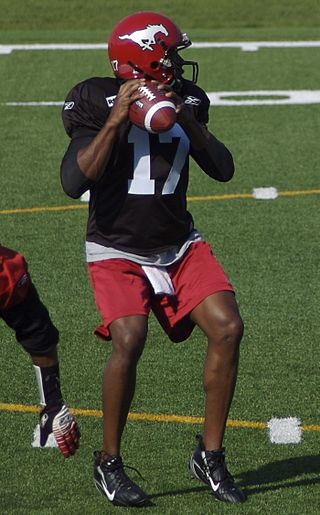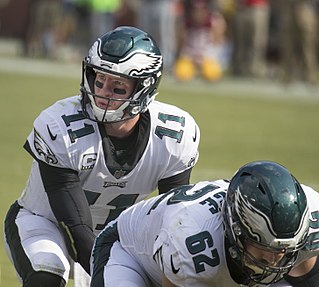
The quarterback, colloquially known as the "signal caller", is a position in gridiron football. Quarterbacks are members of the offensive platoon and mostly line up directly behind the offensive line. In modern American football, the quarterback is usually considered the leader of the offense, and is often responsible for calling the play in the huddle. The quarterback also touches the ball on almost every offensive play, and is almost always the offensive player that throws forward passes. When the QB is tackled behind the line of scrimmage, it is called a sack.

In gridiron football, a lineman is a player who specializes in play at the line of scrimmage. The linemen of the team currently in possession of the ball are the offensive line, while linemen on the opposing team are the defensive line. A number of NFL rules specifically address restrictions and requirements for the offensive line, whose job is to help protect the quarterback from getting sacked for a loss, or worse, fumbling. The defensive line is covered by the same rules that apply to all defensive players. Linemen are usually the largest players on the field in both height and weight, since their positions usually require less running and more strength than skill positions.

Peyton Williams Manning is an American former football quarterback who played in the National Football League (NFL) for 18 seasons. Nicknamed "the Sheriff", he spent 14 seasons with the Indianapolis Colts and four with the Denver Broncos. Manning is considered one of the greatest quarterbacks of all time. A member of the Manning football dynasty, he is the second son of former NFL quarterback Archie Manning, older brother of former NFL quarterback Eli Manning, and uncle of Texas Longhorns quarterback Arch Manning. He played college football for the Tennessee Volunteers, winning the Maxwell, the Davey O'Brien, and Johnny Unitas Golden Arm Awards as a senior en route to victory in the 1997 SEC Championship Game.

The tight end (TE) is an offensive position in American football, arena football, and Canadian football. It is a hybrid that combines the characteristics and roles of both an offensive lineman and a receiver. As part of the receiver corps, they play inside the flanks (tight), contrasted with the split end who plays outside the flanks (wide). Like offensive linemen, they are usually lined up on the offensive line and are large enough to be effective blockers. On the other hand, unlike offensive linemen, they are eligible receivers and potent weapons in a team's offensive schemes.

Kabisa Akili Maradufu Smith is an American former professional football player who was a quarterback in the National Football League (NFL). He was selected by the Cincinnati Bengals in the first round of the 1999 NFL draft, the third quarterback in the first three choices, behind Tim Couch and Donovan McNabb. He played college football for the Oregon Ducks.
The Wonderlic Contemporary Cognitive Ability Test is an assessment used to measure the cognitive ability and problem-solving aptitude of prospective employees for a range of occupations. The test was created in 1939 by Eldon F. Wonderlic. It consists of 50 multiple choice questions to be answered in 12 minutes. The score is calculated as the number of correct answers given in the allotted time, and a score of 20 is intended to indicate average intelligence.

Center or centre (C) is a position in American football. The center is the innermost lineman of the offensive line on a football team's offense. The center is also the player who passes the ball between his legs to the quarterback at the start of each play.

Ted Thompson was an American professional football player and executive in the National Football League (NFL). He was the general manager of the Green Bay Packers from 2005 to 2017. Thompson had a 10-year playing career in the NFL as a linebacker and special teams player with the Houston Oilers from 1975 to 1984.

A tackle is a playing position in American football. Historically, in the one-platoon system prevalent in the late nineteenth and early twentieth centuries, a tackle played on both offense and defense. In the modern system of specialized units, offensive tackle and defensive tackle are separate positions, and the stand-alone term "tackle" refers to the offensive tackle position only. The offensive tackle, sometimes specified as left tackle (LT) or right tackle (RT), is a position on the offensive line that flanks the two guards. Like other offensive linemen, their objective is to block during each offensive play: physically preventing defenders from tackling or disrupting the offensive ball carrier with the intention of advancing the football downfield.
Giovanni Carmazzi is an American former professional football player who was a quarterback for two seasons with the San Francisco 49ers of the National Football League (NFL). He played college football for the Hofstra Pride, throwing for over 9,000 yards. He was selected by the 49ers in the third round of the 2000 NFL Draft. Carmazzi spent the entirety of his NFL career as a backup, never appearing in a regular season game. After being released by the 49ers, he spent one season in NFL Europe and two seasons in the Canadian Football League (CFL).
The New England Patriots generally run a modified Erhardt-Perkins offensive system and a Fairbanks-Bullough 3–4 defensive system, though they have also used a 4–3 defense and increased their use of the nickel defense.
The NFL Alumni Association is a 501(c)(3) nonprofit organization that is composed of former National Football League (NFL) players, coaches, team staff members and associate members who work voluntarily to raise funds for youth-oriented causes and engage in hands-on service to foster the development of "youth through sports and sports through youth". It was founded in 1967.
The following terms are used in American football, both conventional and indoor. Some of these terms are also in use in Canadian football; for a list of terms unique to that code, see Glossary of Canadian football.

Alexander "Ali" Marpet is an American former professional football guard who played seven seasons for the Tampa Bay Buccaneers of the National Football League (NFL).
Players in the National Football League (NFL) wear uniform numbers between 0 and 99, with no two players on a team able to wear the same number outside of the offseason. Rules exist which tie a player's number to a specific range of numbers for their primary position. Additionally, rules exist which limit who may handle the ball on offense: generally players who are designated as offensive linemen, who wear numbers 50–79, are not allowed to handle the ball during a play from scrimmage, though they are allowed to do so if they report to the referee as playing out of position for a tackle-eligible play, if they pick up a fumble, or if they catch a deflected pass.

Joseph Thuney is an American football guard for the Kansas City Chiefs of the National Football League (NFL). He played college football at NC State. He was selected by the New England Patriots in the third round in the 2016 NFL draft.

Joseph Lee Burrow is an American football quarterback for the Cincinnati Bengals of the National Football League (NFL). Following a stint at Ohio State, Burrow played college football at LSU, winning the Heisman Trophy and the 2020 College Football Playoff National Championship as a senior. He was selected by the Bengals first overall in the 2020 NFL draft.
In gridiron football and its variants, American football and Canadian football, the quarterback position is often considered the most important on the team. While there have been a growing number of players of African or minority descent throughout the history of collegiate and professional football, black players have historically faced difficulty in landing and retaining quarterback roles due to a number of factors. In addition, some black quarterbacks claim to have experienced bias towards or against them due to their race. Black players as a whole are disproportionately over represented in the NFL, being only ~13% of the U.S. population yet 67% of NFL players are black, with 17% of quarterbacks being black.
The National Football League 100th Anniversary All-Time Team was voted on by a panel consisting of media members, former players and league personnel in 2019 to honor the greatest players of the first 100 years of the National Football League (NFL). Tom Brady, Larry Fitzgerald, and Adam Vinatieri were the only active players when the team was revealed, while Bill Belichick was the only active head coach to be selected. Tom Brady was the last active player after his retirement following the 2022 NFL season. Johnny Unitas, Jim Brown, Gale Sayers, Don Hutson, Chuck Bednarik, Gino Marchetti, and Dick "Night Train" Lane are also part of the NFL 50th Anniversary All-Time Team and the NFL 75th Anniversary All-Time Team.











